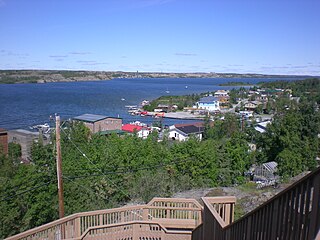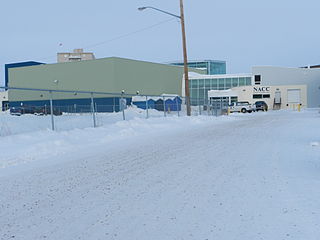
Yellowknife is the capital, largest community, and only city in the Northwest Territories, Canada. It is on the northern shore of Great Slave Lake, about 400 km (250 mi) south of the Arctic Circle, on the west side of Yellowknife Bay near the outlet of the Yellowknife River.

The Gwichʼin language belongs to the Athabaskan language family and is spoken by the Gwich'in First Nation (Canada) / Alaska Native People. It is also known in older or dialect-specific publications as Kutchin, Takudh, Tukudh, or Loucheux. Gwich'in is spoken primarily in the towns of Inuvik, Aklavik, Fort McPherson, and Tsiigehtchic, all in the Northwest Territories and Old Crow in Yukon of Canada. In Alaska of the United States, Gwichʼin is spoken in Beaver, Circle, Fort Yukon, Chalkyitsik, Birch Creek, Arctic Village, Eagle, and Venetie.
Aurora College, formerly Arctic College, is a college located in the Northwest Territories, Canada with campuses in Inuvik, Fort Smith and Yellowknife. They have learning centres in 23 communities in the NWT. The head office for Aurora College is located in Fort Smith.

Norman Wells is a town located in the Sahtu Region, Northwest Territories, Canada. The town, which hosts the Sahtu Regional office, is situated on the north side of the Mackenzie River and provides a view down the valley of the Franklin and Richardson mountains.

Behchokǫ̀, officially the Tłı̨chǫ Community Government of Behchokǫ̀, is a community in the North Slave Region of the Northwest Territories, Canada. Behchokǫ̀ is located on the Yellowknife Highway, on the northwest tip of Great Slave Lake, approximately 110 km (68 mi) northwest of Yellowknife.

Łutselkʼe, also spelt Łutsël Kʼé, is a "designated authority" in the North Slave Region of the Northwest Territories, Canada. The community is on the south shore near the eastern end of Great Slave Lake and until 1 July 1992, it was known as Snowdrift, as the community lies near the mouth of the Snowdrift River.

Gamètì, officially the Tłı̨chǫ Community Government of Gamètì is a community in the North Slave Region of the Northwest Territories, Canada. Gamètì, according to the Prince of Wales Northern Heritage Centre means "rabbit-net lake". 'Gah means 'rabbit', and "mi" means net, "tì" means lake, or water. It is one of the four Tłı̨chǫ communities which form part of the Tlicho Government.

Higher education in Canada includes provincial, territorial, Indigenous and military higher education systems. The ideal objective of Canadian higher education is to offer every Canadian the opportunity to acquire the skills and knowledge necessary to realize their utmost potential. It aspires to cultivate a world-class workforce, enhance the employment rate of Canadians, and safeguard Canada's enduring prosperity. Higher education programs are intricately designed with the perspective of the learner in focus, striving to mitigate risks and assure definite outcomes.

Higher education in the Northwest Territories traces the development and expansion of higher education in Canada's Northwest Territories. In Canada, education is a provincial or territorial concern and there is no national regulation nor accrediting body.

The Northern Arts and Cultural Centre is located in Yellowknife, Northwest Territories, Canada. It is the only performing arts centre in the NWT.
This timeline of Yellowknife history summarises key events in the history of Yellowknife, a city in the Northwest Territories, Canada.

Indigenous education specifically focuses on teaching Indigenous knowledge, models, methods, and content within formal or non-formal educational systems. The growing recognition and use of Indigenous education methods can be a response to the erosion and loss of Indigenous knowledge through the processes of colonialism, globalization, and modernity. Indigenous education also refers to the teaching of the history, culture, and languages of Indigenous peoples of a region.

The Native American Languages Act of 1990 (NALA) is a US statute that gives historical importance as repudiating past policies of eradicating indigenous languages of the Americas by declaring as policy that Native Americans were entitled to use their own languages. The fundamental basis of the policy's declaration was that the United States "declares to preserve, protect and promote the rights and freedom of Native Americans to use practice and develop Native American Languages".

Blachford Lake is a remote lake in Northern Canada, near Yellowknife. The lake is 17 km (11 mi) and sits on precambrian rock. The lake is located at 62 09.97'N, 112 40.96' W and is to the north of the start eastern arm of the Great Slave Lake. It is home of the Dechinta: Centre for Research and Learning, an on-the-land university, co-founded in part by Glen Coulthard, that teaches traditional northern skills.
Native American feminism or Native feminism is, at its root, understanding how gender plays an important role in indigenous communities both historically and in modern-day. As well, Native American feminism deconstructs the racial and broader stereotypes of indigenous peoples, gender, sexuality, while also focusing on decolonization and breaking down the patriarchy and pro-capitalist ideology. As a branch of the broader Indigenous feminism, it similarly prioritizes decolonization, indigenous sovereignty, and the empowerment of indigenous women and girls in the context of Native American and First Nations cultural values and priorities, rather than white, mainstream ones. A central and urgent issue for Native feminists is the Missing and murdered Indigenous women crisis.
Leanne Betasamosake Simpson is a Mississauga Nishnaabeg writer, musician, and academic from Canada. She is also known for her work with Idle No More protests. Simpson is a faculty member at the Dechinta Centre for Research and Learning. She lives in Peterborough.
Melaw Nakehk'o is an actress, artist, traditional moose hide tanner, and co-founder of the First Nations organization Dene Nahjo. She is primarily known for her role as the kidnapped Arikara woman Powaqa in the 2015 film The Revenant.

Glen Sean Coulthard is a Canadian scholar of Indigenous studies who serves as an associate professor in the political science department at the University of British Columbia. A member of the Yellowknives Dene First Nation, he is also a co-founder, educator, and on the board of directors at Dechinta: Centre for Research and Learning. He is best known for his 2014 book, Red Skin, White Masks: Rejecting the Colonial Politics of Recognition, which has been released in both English and French.
Land-based education centres land as the primary teacher, as Indigenous communities' knowledge systems are inseparable from their lands. Land-based education is place-specific, grounded in culture, and aims to strengthen Indigenous communities by reviving their reciprocal relationships with their lands through the practice of their land-based traditions. These programs can have many goals, the main one being to transmit knowledge to future generations. Land-based education programs cannot be easily replicated elsewhere, as they are meant to be grounded in the cultural roots tied to a place and the community that has stewarded those lands since time immemorial. However, they can inspire other communities to develop their own land-based education programs or projects. That being said, there are many commonalities among land-based education pedagogies. They often involve mentorship from community leaders and knowledge keepers, youth are encouraged to participate, and they emphasize using traditional languages and Subsistence practices. Land-based education can be small or large scale. In the words of Yellowknives Dene scholar, Glen Coulthard, examples of land-based education include but are not limited to: "'walking the land' in an effort to re-familiarize ourselves with the landscapes and places that give our histories, languages, and cultures shape and content; to revitalizing and engaging in land-based harvesting practices like hunting, fishing, and gathering, and/or cultural production activities like hide-tanning and carving, all of which also serve to assert our sovereign presence on our territories in ways that can be profoundly educational and empowering; to the re-occupation of sacred places for the purposes of relearning and practicing our ceremonial activities."

Indigenous resurgence is a transformative movement of resistance and decolonization. The practice of Indigenous resurgence is a form of regenerative nation-building and reconnection with all their relations. It constitutes kin-centric relationships among BIPOC peoples and with the natural world.













